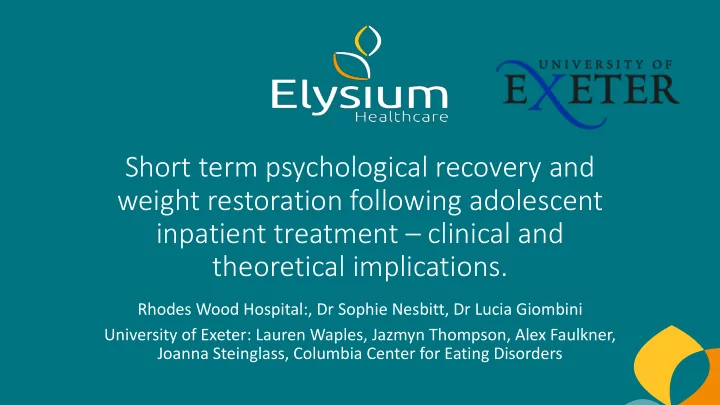

Short term psychological recovery and weight restoration following adolescent inpatient treatment – clinical and theoretical implications. Rhodes Wood Hospital:, Dr Sophie Nesbitt, Dr Lucia Giombini University of Exeter: Lauren Waples, Jazmyn Thompson, Alex Faulkner, Joanna Steinglass, Columbia Center for Eating Disorders
Implementing the Five Year Forward View (2016) • Funding to inpatient services to initially increase while community services are developed • CYP-IAPT training, team development, supervision • At least 3400 staff to be trained by 2020/21 • Reduction of inpatient beds by 2020/21 • Freed up funding to be redistributed to community and specialist services • Improving access and waiting times 2
Evidence-based practice (Sackett et al, 2000) 3
4
Steps of Care for Adolesce cents with An Anor orexia xia Ne Nervos osa- a a De Delp lphi i Study Samantha Buchman, PsyD Evelyn Attia, MD Lisa Dawson, PhD Joanna E. Steinglass, MD 5
Results – summary • Consensus was achieved on several features of a treatment algorithm: • Family-Based Treatment (FBT) is recommended as first-line treatment. • Hospitalization is recommended when medical instability, suicidality or acute food refusal are present at any point in treatment. • Consensus was not reached on when to transition from a higher level of care to a lower level of care. 6
7
Shortened Inpatient Stays for Children and Adolescents with Anorexia Nervosa Lauren Waples, Dr Sophie Nesbitt, Dr Lucia Giombini, Jazmyn Thompson, Dr Huw Williams 8
Method • Outcome measure data collected by Rhodes Wood Hospital from 2016-2018 • EDE-Q , CET, MSCARED, CDI, STAI • Administered on admission, 85% IBW and 95% IBW • Males and females aged 11-18 with a diagnosis of Anorexia Nervosa • (N = 42; age: M = 15.02, SD = 1.538). • Treatment as usual • FBT, individual therapy, group therapy 9
Data Analysis • Identifying any significant changes in the outcome measures between time 1 (admission), time 2 (85%) and time 3 (discharge) • Linear mixed effects model with post-hoc comparison • Time as a fixed factor • Predicting factors for response to treatment time • Linear regression model • MSCARED Qualitative data • Thematic analysis to determine difference in themes of motivation between response to treatment subgroups 10
Results – EDE-Q Figure 2. EDE-Q case series, Jazmyn Thompson, University of Exeter 11
Results – EDE-Q Figure 1: Histogram to show the mean global EDE-Q scores at admission, 85% IBW and discharge. 12
Results - CET Figure 3. A Histogram to show the mean CET scores on admission, 85% IBW, and Discharge 13
Results – CDI Figure 3. Histogram of mean CDI scores at admission, 85% IBW and Discharge 14
15
MSCARED • The Motivational Stages of Change for Adolescents Recovering from an Eating Disorder (MSCARED) (Gusella et al. 2003) is a brief questionnaire designed for adolescents. • Based on Prochaska and DiClement’s model of stages of change • Guided by motivational and narrative approaches to assessment and therapy (Gusella et al. 2003). 16
To be able to Healthy Going exercise relationship home/getting out with food of hospital Reasons to Recover For health For family 17
Results - MSCARED 15 (A) Out of hospital (A) • To go home/get out of hospital 26 You’re not in a hospital instead of exploring the world (85) • (85) Getting out of hospital (D) • 21 (D) Get out of here and live my life (D) • For Family 24 (A) Making my family happier (A) • 27 • I can be with my family/friends if I recover (A) (85) Making my family proud and happy for me (85) • 31 (D) • To have a good/normal relationship with my family (85) My parents will find it easier to live with me (D) • To be able to exercise 10 (A) Exercise everyday without being told that I can’t (A) • 6 (85) I will get back to my happy life again with sport (football).. (85) • 6 (D) • Exercising healthily (D) Health 12 (A) Being healthy (A) • 7 (85) Having a healthy body and the strength to do the things I enjoy (85) • 8 (D) • Being fitter, able to do more (D) Healthy relationship with food 8 (A) I don’t want to have a problem with food (A) • 5 (85) Enjoying food (85) • 18 5 (D) • Don’t have to be obsessing about food all the time (D)
Theory: In relation to anxiety/NORA model Does state or trait anxiety predict weight restoration for young people with Anorexia Nervosa? Testing the noradrenergic hypothesis. Alex Faulkner, University of Exeter 19
20
State Anxiety 21
Thank you for listening! Any questions? 22
Recommend
More recommend